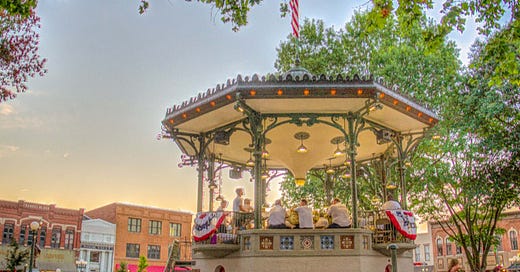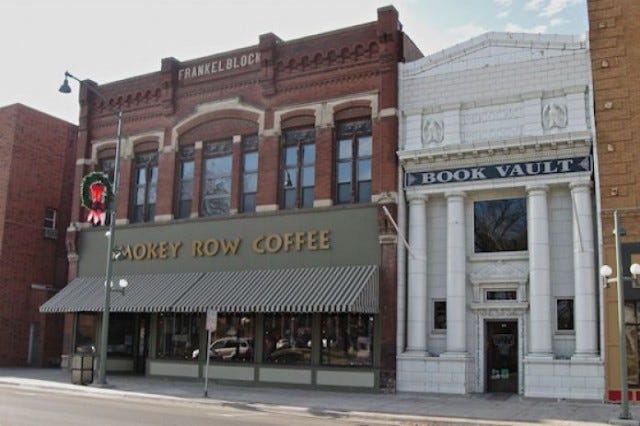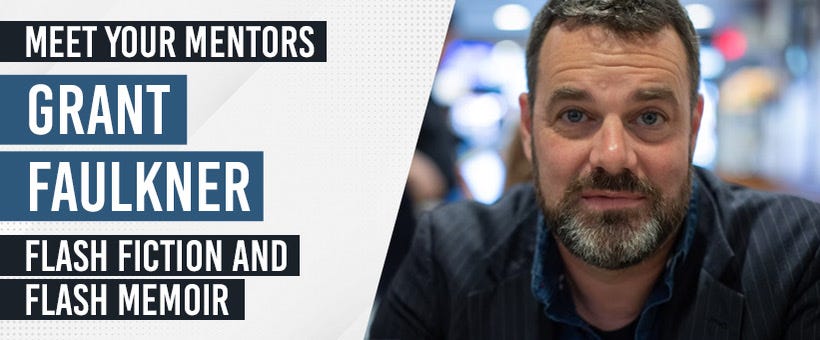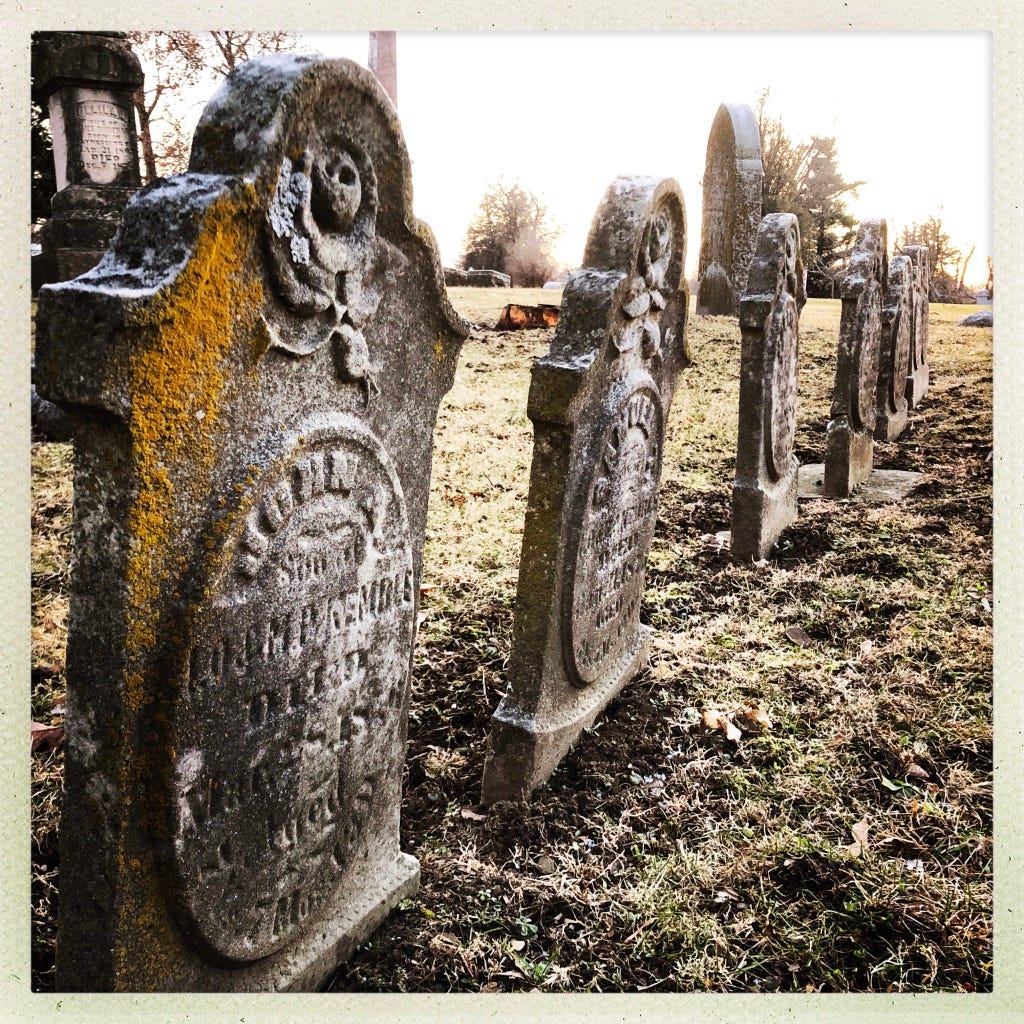If you’ve read this newsletter or listened to my podcast, you’ll know I grew up in a small town in Iowa, I sometimes write about small towns, and I have a complicated relationship with my hometown—or a fascination might be a better way to put it, an endless fascination.
I often say that growing up in a small town is the best habitat for a budding writer—because a small town is a fish bowl full of drama. It’s like a never-ending mini-series, rife with characters playing out all sorts of dramatic desires on the stage.
The smallness of a place can hem people in, but it can also magnify their sins and frustrations and hopes and dreams because of its smallness. There is no way to truly hide yourself in a small town.
I grew up in Oskaloosa in the 70s and early 80s, a permissive and somewhat wild era by definition. I remember hearing stories of key parties, even as the daily farm reports rattled on radios through kitchens across town. Drunk driving was a norm (among adults and we teens). Divorces, which were unimaginable and rare in previous eras, swept through the town and affected most of my friends’ families. The summer after seventh grade, I watched as one good friend after another started smoking pot, leaving me behind (for a while).
On the other side of things was a rigid morality. Conservative Christianity was just beginning to burgeon, and the local evangelical churches forbid the kids in their congregations to go to school dances (hello, Foot Loose), and protested when the choir dresses for the girls had slits.
One of the most interesting things about small towns for me, though, is how a small town is a peculiar kind of family. As the writer Richard Russo said, “People in small towns, much more than in cities, share a destiny.”
I feel close to the kids I went to kindergarten with, even though I haven’t seen or spoken to many of them in decades—because of this strange destiny we share, this past that has shaped us, as if we grew up in the same house, with the same parents.
And we did essentially grow up in the same house. Sometimes when I go home, I marvel at the small patch of land the town resides on, and how that small patch of land held such bigness when I was growing up. The smallness gave us a priceless although often painful closeness while at the same time it gave us what felt like a big stage, especially as a child.
Tom Perrotta—master of the suburban novel
I recently had the opportunity to reflect on all of this because the wonderful writer Tom Perrotta was on Write-minded. Tom is noted for being a master of the suburban novel, especially Election and Little Children, both of which were made into Oscar-nominated films.
I should pause and draw a distinction between small towns and suburbs. I have always been very conscious of my hometown as a place with a history going back generations, and a place that wasn’t attached to a city, but its own thing. A suburb is generally not as rooted in a place, however, and often doesn’t have a unique personality.
Still, suburbs are small places like small towns and equally dramatic for storytellers because they’re a web of cul de sacs, and often all of the houses were built in the same period, so there’s a homogenous aesthetic that can be portrayed as deadening for the soul.
There are so many classics of the form and iconic characters: Richard Yates’s Revolutionary Road, John Updike’s Rabbit series, nearly all of John Cheever’s work, Richard Ford’s Independence Day, Jonathan Franzen’s Corrections, Celeste Ng’s Little Fires Everywhere, and A.M. Homes’s Music for Torching, to name a handful that come to mind.
One thing about the American suburb is that even though they’re created as a type of utopia with new nice houses and schools and parks, away from urban grit, the American suburb is also often portrayed as the place dreams go to die.
“There is a sense in America that suburbs are the place you want to go, and that’s the place where successful lives happen,” said Perrotta. “If your life feels disappointing in some sense in a place where you're supposed to feel fulfilled, then there is a special sadness.”
Prosperity as oppression
You’ll notice from my list of notable suburban books that many of them have been written by white American men, and there’s a common theme in all of them: men who end up in the suburbs are essentially smothered by their own privileges. Their material prosperity becomes an odd form of oppression, as if they’re victims of the American dream, shut off from their more spiritual, manly, or adventurous sides.
Suburbs certainly attract a lot of stories about sexually repressed and unfulfilled people—and the stories play well on the screen, as we’ve seen with movies like American Beauty, which might be the ultimate suburban drama, The Ice Storm, which is based on Rick Moody’s novel, and then The Virgin Suicides, which is based on a novel by Jeffrey Eugenides.
All of these novels are centered in a general American repression, and sexual repression in particular.
The escape from the small town for me was the car. We ditched school and sat in the car at the back of the cemetery, smoking pot and talking about Nietzsche (thank God for my intellectually challenging friends). We drove around country roads endlessly, blasting punk rock, quarts of beer nestled in our laps. We went to the drive-in every week, but I never saw a movie because the drive-in was a playground of teen partying.
So much of my learning happened in cars with my friends.
I credit Oskaloosa with giving me many of my dreams, simply because I fantasized about living other lives, lives that were elsewhere. I was part of the place, yet not there. I was actually voted “Most likely to move furthest away” in high school. I didn’t want anyone looking over my shoulder and judging me. I wanted to express myself.
Question: What is your favorite story about a small town of a suburb? Please let me know in the comments below!
Spare a dime to help me publish this newsletter?
Please consider becoming a paid subscriber.
Listen to Tom Perrotta on Write-minded
Because quotes about small towns
“To live in a small town is to know that nothing, and everything, is happening all at once.”
—Elizabeth Strout
“If you're going to live in a small town, you can't give the smallest bit of scandal, boredom, jealousy or competition something to feed on.”
—Barbara Kingsolver, "Animal Dreams"
Need a writing mentor?
Over a ten-week period, you'll be in a group made up of five writers and one mentor, with weekly meetings designed to improve your writing—no matter what stage you're in—through constructive critiques.
Join my accountability writing group!
Can't believe it's been an entire year already since I started my "Just Write!" group. It's the highlight of my writing time each week.
I am offering a FREE ACCOUNTABILITY WRITE-IN on Monday, April 7 (5-7pm) for writers who want to sample the program.
Every Monday and Wednesday night, writers hop onto Zoom—so you can join from anywhere!—talk a bit about writing challenges and breakthroughs, and then dive into writing.
If you're struggling to create a writing routine—or if you just want to write with a warm, inspiring, and fun community—join us!










I love that you quote Elizabeth Strout, who is a master of telling small town stories. Her stories are some of my favorites. After spending my entire life rejecting the small town I grew up in, I, too, find myself endlessly fascinated. In fact, the older I get, the more my writing seems to seep into those crevices.
I loved the whole little world of Olive Kitteridge that Strout created. And would The Lottery qualify?